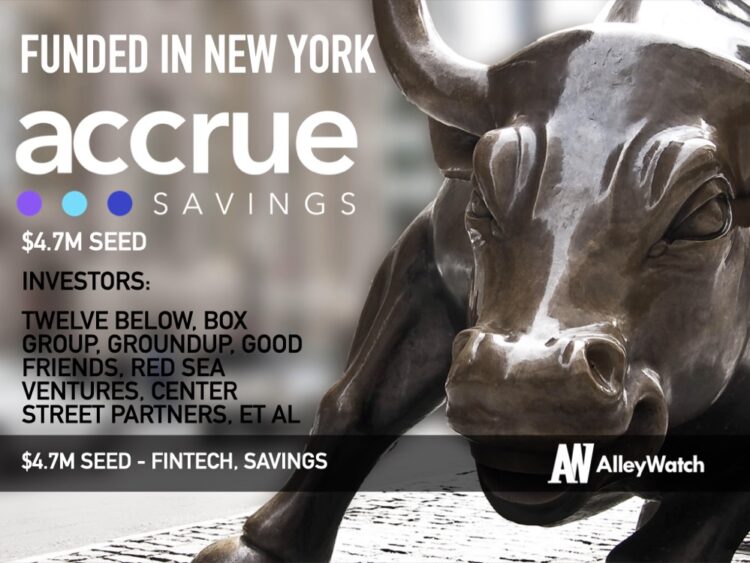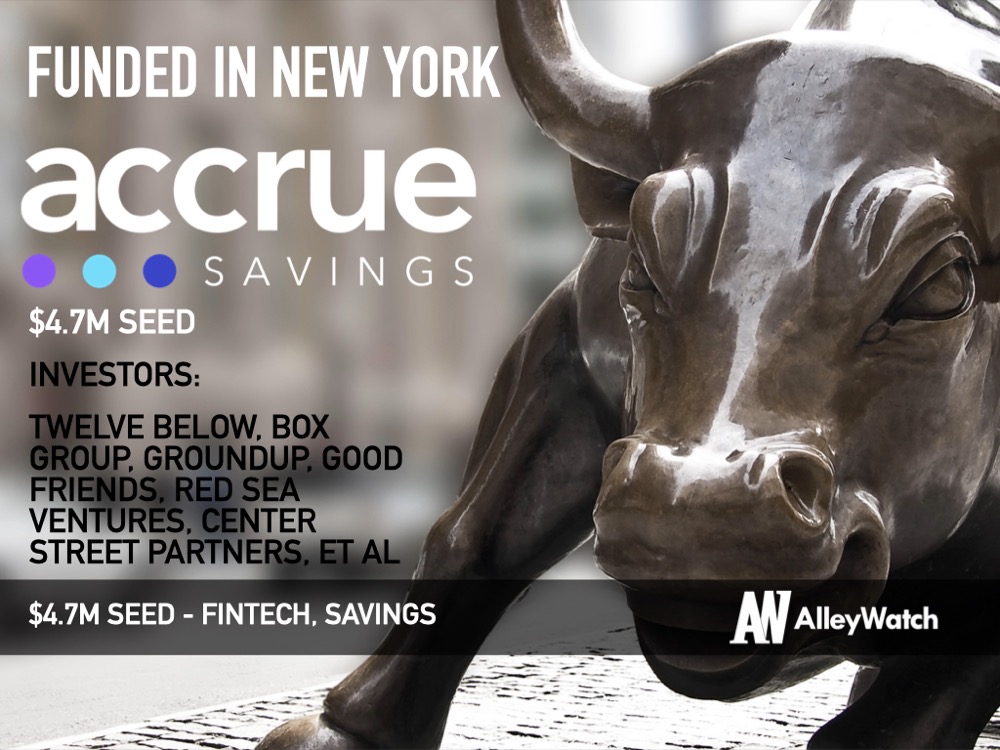The behavioral shift to online purchases during the pandemic led to a meteoric rise in the use of Buy Now, Pay Later solutions ($97B in 2020), which has garnered significant attention. So much so that, just yesterday, the House Subcommittee of Financial Services held a hearing focused on the risks and benefits of BNPL. According to Credit Karma, 34% of those who have used BNPL have fallen behind on one or more payments. Accrue Savings is an innovative new offering launching today that’s pushing consumers towards more prudent spending through incentive-based savings tied to specific purchases rather than incurring point-of-sale debt as with BNPL. Consumers using Accrue are given FDIC-insured accounts and are rewarded for meeting savings milestones in the form of cash rewards from brands, building a pipeline of future purchases for participating brands while creating brand loyalty. Friends and family are also able to contribute towards the savings plan.
AlleyWatch caught up with Accrue Savings CEO and Founder Michael Hershfield to learn more about the problem the historical disconnect between technology and savings that Accrue addresses, the company’s strategic plans, launch, recent funding, and much, much more…
Who were your investors and how much did you raise?
We raised $4.7M in seed funding from investors Twelve Below, Box Group, Groundup, Good Friends, Red Sea Ventures, Center Street Partners, and many seed investors including Scott Belsky, Gokul Rajaram, and many other NYC angels and operators.
Tell us about the product or service that Accrue Savings offers.
Accrue Savings is a financial technology company that provides access to an FDIC-insured account tied to a specific purchase, which helps consumers save for the product or service they love and want while earning cash rewards from their favorite brands. Customers get to choose their saving schedule, and brands provide cash incentives to reward shoppers for saving.
As they save, the customer can ask for support from friends and family, who can contribute to their savings goals, making that final purchase a debt-free personal achievement.
 What inspired the start of Accrue Savings?
What inspired the start of Accrue Savings?
Innovation has never been aimed at helping consumers save – there’s no interest, no incentives, no rewards, no integration. Not only does this add up for consumers, but this comes at a cost to brands: you can’t say you care about customers and only offer them credit programs.
Consumers want to save money: Our research shows that over 60% of Americans are currently saving for a big discretionary purchase. These purchases include cars, electronics, down payments for homes, and home investments or renovations. Americans improved their savings habits during the past 18 months of uncertainty with the pandemic for the first time in 45 years, according to a survey conducted by NerdWallet.
I’ve always been passionate about advocating for consumers, and I created Accrue Savings so that retailers can offer consumers incentives-driven saving for a major purchase.
How is Accrue Savings different?
For consumers and brands, there’s never been anything like Accrue Savings: We’re incentivizing customers to save now and buy later.
With Accrue Savings, brands can finally incentivize customers who choose saving over debt by offering them cash rewards when they meet milestones on their savings journey. When customers elect a savings-based shopping strategy, these brand partners will be in lockstep with their customers’ purchasing plans. Additionally, with customer acquisition costs on the rise and the ongoing battle with online shopping cart abandonment, Accrue Savings also expands addressable audiences by increasing accessibility to product and services.
What market does Accrue Savings target and how big is it?
Accrue Savings can support consumer purchases across every vertical, and can support merchants anywhere that incentives-driven savings can be introduced.
What’s your business model?
The Accrue Savings model is performance-driven: We make money on the interchange fee when users use our debit card to complete purchases. We also charge a fee from the brand only after the purchase is a success.
What are your post-COVID office plans??
As a former WeWork executive, I believe in the power of in-person engagement. But I also deeply believe in the power of choice for today’s worker. Companies need to give their employees the opportunity to engage in person, but also remote options. It is the right thing to do.
What was the funding process like?
I had tremendous early support from my friends at Groundup Ventures, who were instrumental in the pre-formation of the idea and during the 100-day sprint. During the sprint, I kept many investors and friends apprised of the effort which accelerated my fundraising efforts after I achieved the KPIs.
What are the biggest challenges that you faced while raising capital?
One of the biggest challenges as an entrepreneur is being comfortable with rejection. Regardless of the success of the raise, you always face a few dubious investors. With Accrue Savings, I heard more than a few investors tell me that Americans don’t save. I am confident we will prove them wrong.
What factors about your business led your investors to write the check?
Earlier this year, I focused on running a 100-days sprint. The success or failure of this sprint was my objective barometer for whether or not I would launch Accrue Savings. I had two KPIs: Getting three merchants on board, and uncovering evidence that consumers would want to use Accrue Savings. I ended the sprint with commitments from five brands, including Casper, and with research proving that consumers want to save and will be excited to be rewarded for savings behaviors. We’re excited to bring this to the world after months of iterating on the product.
Earlier this year, I focused on running a 100-days sprint. The success or failure of this sprint was my objective barometer for whether or not I would launch Accrue Savings. I had two KPIs: Getting three merchants on board, and uncovering evidence that consumers would want to use Accrue Savings. I ended the sprint with commitments from five brands, including Casper, and with research proving that consumers want to save and will be excited to be rewarded for savings behaviors. We’re excited to bring this to the world after months of iterating on the product.
What advice can you offer companies in New York that do not have a fresh injection of capital in the bank?
Create bite-sized sprints to test and prove out your idea. Think small, to think big. It will help you capture the imagination of the people around you, and prospective investors.
Where do you see the company going now over the near term?
I want to build a 100-year company that transforms how Americans save and engage with their money.
What’s your favorite outdoor dining restaurant in NYC?
Barney Greengrass.




